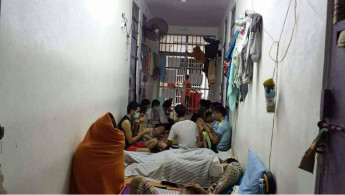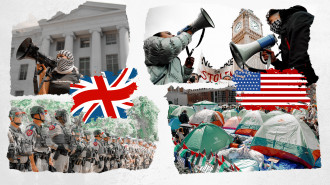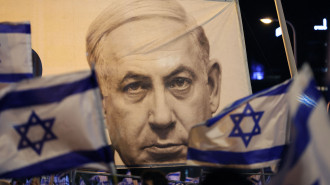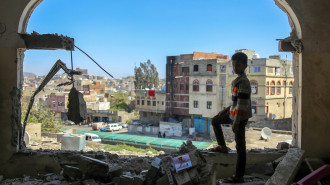Matt Broomfield is a freelance journalist who has written for the Independent, The New Statesman, VICE and Motherboard.
Indonesia: Refugees abandoned by Australia in squalid detention centres
The squalid camp where they are confined is pictured here, in exclusive images shot by the refugees themselves.
"We are worried about our uncertain fate," says Erfan, a member of the Hazara minority persistently massacred by the Taliban in Afghanistan. He has been detained in Indonesia for three years. "Most of us are suffering from psychological illnesses due to the long wait we have suffered.
"Unless the resettlement countries make the program of resettlement quicker, there is no way out."
Instead, Australia and the United States have stopped resettling asylum-seekers from Indonesia altogether, leaving thousands of detained refugees wondering if they will ever be freed.
Indonesia
None of the seven countries worldwide to host over half a million refugees are in Europe or North America.
And as Europe outsources responsibility for housing 3.4 million refugees to the autocratic Erdogan administration in Turkey, so increasingly draconian border regimes in Australia and the USA are condemning hundreds of thousands of refugees to linger for years in inhumane conditions in refugee camps across West Asia.
 |
Human rights campaigners who filmed undercover footage of the camp reported conditions worse than they saw while working in South Sudan |  |
These refugees' cry for help comes as asylum-seekers in a similar camp in Manus, Papua New Guinea, face starvation and sickness in squalid conditions cut off from power, water, food and the outside world.
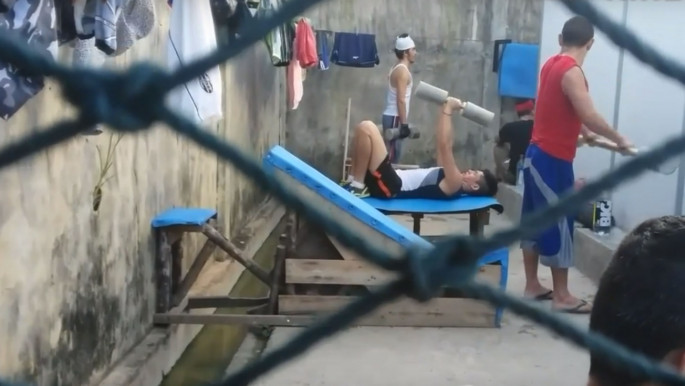 |
|
| Refugees lift weights in a rudimentary gym [Matt Broomfield/TNA] |
Indonesia is not a signatory to the 1951 Refugee Convention, and cannot officially settle refugees inside its own borders. Around one in three of the country's 14,000 asylum-seekers are therefore trapped in violent, unsanitary detention centres, including nearly 1000 detained minors.
The inmates of Hazara refugee Abdhul's camp sleep ten or more to a cramped room, and pass their days lifting weights made of old tin cans and wood, kicking around old water bottles, and trying to study. Many are minors under the age of 18.
"For three years we have done everything right," says Abdhul*, also detained for over three years. "Cleaning the camp, cooking our food, exercising on a little court, surrounded by high grey walls. The hot weather is persecuting us. Our conditions are not acceptable."
"The water is not enough, therefore we shower with the rainwater," says long-term inmate Hussain*. "We all try to learn English, but it is particularly difficult [for us]." The asylum seekers did not wish to comment on their treatment by the camp guards, and asked that the camps not be identified by name.
 |
Indonesia is not a signatory to the 1951 Refugee Convention, and cannot officially settle refugees inside its own borders |  |
Over a third of refugee inmates in Indonesia interviewed by Human Rights Watch reported instances of physical abuse, including electric shocks, flogging with cables, and the beating to death of one Afghan man in 2012.
But those The New Arab spoke to were keen to put the blame on the UN's failing resettlement programme, under which less than one per cent of some 16 million refugees identified across the globe are resettled each year.
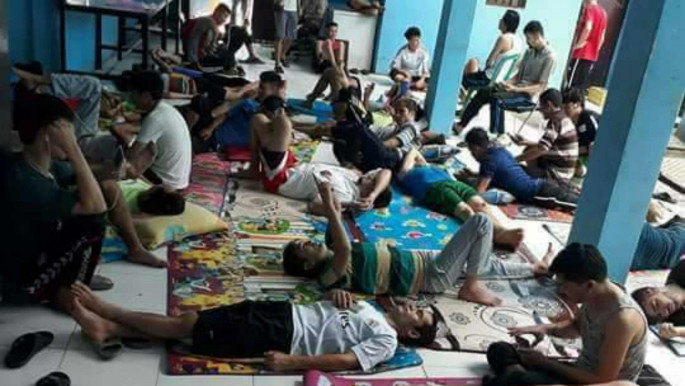 |
|
| There is not much space for detainees to relax [Matt Broomfield/TNA] |
The long wait
For his part, Abdhul had already been waiting behind barbed wire for three years by the time he was even registered as an asylum-seeker. Indonesian law permits immigration detention for up to 10 years without judicial review.
Earlier this year he and the other inmates were told by Thomas Vargas, the head of UNCHR in Indonesia, that they "might be here for ten more years… and maybe [even] after ten, be forced to go back. He said if we can't tolerate it, we should 'go back to our country'."
 |
Many of these refugees are terrified of speaking out for fear of reprisal from the authorities that have absolute control over their lives |  |
But as Abdhul points out, that would mean facing the Taliban – who fired on a convoy of cars he and his father were driving in to deliver supplies for the government, setting his father's vehicle aflame and forcing him to flee.
"My mother said that for all our safety, I had to leave Afghanistan," he recalls. "We don't know where my father is, if he is alive or dead.
"I don't have a work permit and I feel horrible that I cannot work or do anything for my family. Sometimes they have to send me money – I feel awful saying this. I should be supporting them. I do not want my sisters to remain illiterate."
Malcolm Turnbull's government has trumpeted its hard-line stance on refugees arriving irregularly, unlike Europe refusing to take in anybody who arrives by smuggler's boat. In 2015, they went so far as to pay tens of thousands of dollars to smugglers arriving in Australia to return asylum-seekers to Indonesia, in a deal itself illegal.
Refugees like Abhdul were told to wait and follow the legal route, even if this did would many years. But the Australian government has now stopped accepting all resettled refugees from Indonesia.
Likewise, the United States used to be the number one destination for resettled refugees from Indonesia, but the Trump administration has also suspended resettlement.
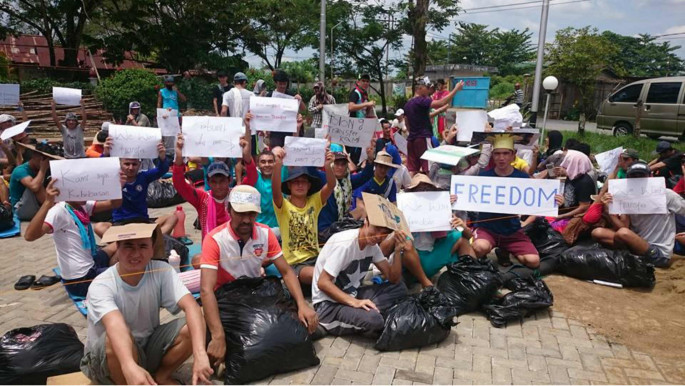 |
|
| Refugees protest against their continued detention [Matt Broomfield/TNA] |
Abandoned
Asylum-seekers who have sought to follow legal routes into countries where they stood a chance of life free from persecution, now wonder if they will be trapped in limbo forever. Some who have been granted UNHCR refugee status have already been incarcerated in Indonesia for years or more.
Indonesia is working with UNCHR to transfer some detained refugees to open community shelters within the country, but as Abdhul points out this scheme is a poor alternative to relocation to a less impoverished country, and cannot accommodate the thousands of refugees still detained - "We must accept the life of a prisoner," he says.
This led to the situation on Nauru and Manus Island, Papua New Guinea, where those intercepted as they attempt to enter Australia by boat are detained.
 |
The camps are hotbeds of murder, physical and sexual abuse, torture, medical neglect, self-harm and suicide |  |
Again, the camps are hotbeds of murder, physical and sexual abuse, torture, medical neglect, self-harm and suicide. Their inmates have been told they will never enter Australia.
Refugees in the Manus Island camp are currently under siege by the Papua New Guinean Armed Forces, refusing to move to a new detention centre they say is even more dangerous and demanding resettlement out of the country.
Twitter Post
|
In a statement, the Australian Government said: "Claims that Australia 'abandoned' former-residents are not correct.
"The Department's staff no longer had authority to remain on the PNG Naval Base and they departed.
"Former-residents are able to move to three suitable alternative accommodation options at other locations in PNG's Manus Province.
"Former-residents who choose to stay at the RPC-site are doing so fully informed that PNG has provided them with suitable alternatives and that these can be accessed at any time."
But Manus residents say nowhere in Papua New Guinea is safe for them and they fear further machete attacks from angry locals if they move to the new facilities.
Their water tanks were bored with holes, they are digging holes in the ground for muddy water, and food aid and medical care are being turned away. Refugees are drawing close to death.
Human rights campaigners who filmed undercover footage of the camp reported conditions worse than they saw while working in South Sudan.
"As a person who has been in this prison camp and witnessed so many abuses, so much humiliation, and the killing of innocent people, I would like to say that this is now a part of Australia and its reputation," said Kurdish journalist Behrooz Boochani, who is among those trapped in Manus.
Many of these refugees are terrified of speaking out, for fear of reprisal from the authorities that have absolute control over their lives. But as years of their lives slip away or what could be their final days rush past, they see no other choice.
"We are a peaceful people," Abdhul says. "Even though there is a lot of bad in the world, these are good men here with me, men who would lead a peaceful life and be good neighbours and good citizens."
*Names changed at interviewees' request.
